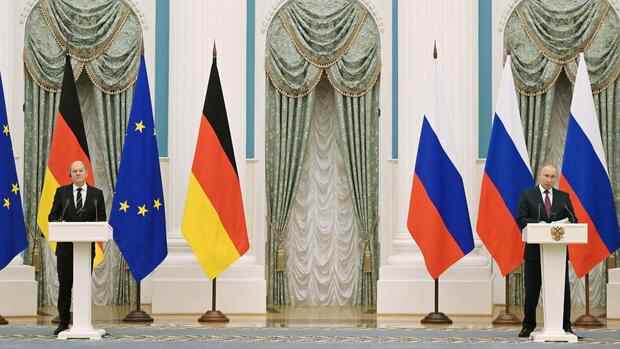Berlin, Brussels, Moscow In the Ukraine crisis, there are indications for the first time in weeks that a military conflict could still be avoided. Shortly before Chancellor Olaf Scholz arrived in Moscow, the Russian Ministry of Defense announced that troops would be withdrawing from the Ukrainian border.
“The units of the South and West Military Districts, which have completed their tasks, have already transferred to the rail and road transport and will start leaving for their garrisons today,” said Ministry spokesman Major General Igor Konashenkov. However, the ministry did not provide any details on the number of soldiers withdrawing.
“We don’t want a war,” said Russian President Vladimir Putin after the meeting with Scholz, emphasizing that he was ready for a dialogue. At the same time, however, he referred to Russian security interests and demanded that NATO must rule out Ukraine becoming a member of the western defense alliance now and not only in the future.
Top jobs of the day
Find the best jobs now and
be notified by email.
A handshake was not possible for Scholz: Russia’s President kept the Chancellor at a distance after he had refused a Russian PCR test on landing. Nevertheless, the chancellor’s visit was under better omens than that of other Western mediators.
Scholz called it a “good sign” that some Russian troops had been withdrawn from the border with Ukraine. At the same time, the Chancellor stressed that there would be serious consequences for Russia should there be an attack on Ukraine. “It is our damned duty to stand up for peace,” said the chancellor after the almost four-hour talk with Putin. De-escalation is urgently needed.
Scholz: “It is our damned duty to prevent a military escalation”
Putin was also willing to talk: Russia “of course” doesn’t want a war. However, the withdrawal of its own troops does not mean that Russia has given up its demands for security guarantees. The Kremlin chief made that clear once again.
When asked whether the troop withdrawal that had begun would continue, the Kremlin chief replied: “Russia is acting according to plan.” How things will continue also depends on the results of the negotiations. The answer received so far “does not correspond to Russian needs”. Russia is ready to talk about the issues of European security, missile deployment and transparency, but only as a whole with the most important demands.
The government in Ukraine and NATO therefore reacted skeptically to the announcements from Moscow. Allianz Secretary General Jens Stoltenberg welcomed the signals from Moscow and spoke of “cause for cautious optimism”. However, he emphasized that there were no concrete signs of a further withdrawal of troops from the border area. The information from the Russian side would have to be “verified in the next few days,” said Julianne Smith, US ambassador to the Western Defense Alliance.
The Russian Ministry of Defense published images that are intended to prove the withdrawal of some troop units to the bases.
(Photo: dpa)
In December, Moscow made similar claims, but then continued to deploy troops instead of helping to de-escalate. “Only when we see a withdrawal do we believe in de-escalation,” said Ukrainian Foreign Minister Dmytro Kuleba in Kiev.
Putin: NATO accession moratorium not a solution for Ukraine
The fact that the two sides are still far apart was particularly evident in Moscow when it came to the question of Ukraine’s possible NATO membership. According to the Russian President, a moratorium is not a solution. “What does that change for us if Ukraine joins not tomorrow but the day after tomorrow?” he asked. Russia now wants to protect itself against this, otherwise it will be too late for the security of the country.
Although Scholz emphasized that NATO membership is not currently under discussion, he also underlined the sovereignty of the government in Kiev.
The German Chancellor continues to pin his hopes on the Minsk Agreement and the Normandy Format, a round of negotiations founded in 2014 by Russia, Germany, France and Ukraine on issues related to the Ukraine conflict.
>> Read also: Multimanager Klaus Mangold: “War or invasion harms Putin’s goals”
The promise of the Ukrainian president to present the draft legislation to the government in Kiev on the statute of the Donbass, the elections and the constitutional issue before the next negotiations is an important step forward. The Chancellor demanded that this must be the starting point for a peaceful solution.
NATO and the EU warned Putin against recognizing the two breakaway Ukrainian regions of Luhansk and Donetsk as people’s republics. Such an approach would be a violation of international law, Ukraine’s territorial integrity and authority and the Minsk peace accords, NATO Secretary General Stoltenberg said.
There were also differences in Moscow on the subject of Nord Stream 2. With regard to the controversial Baltic Sea pipeline, the Chancellor emphasized that a further escalation of the crisis would “have serious political and economic consequences, everyone understood that”.
Putin, on the other hand, once again campaigned for what he saw as a “purely commercial” pipeline project that would ensure Europe’s energy security. He assured Ukraine that it should remain a transit country for Russian gas even after the Baltic Sea pipeline was commissioned.
Putin: “Schröder is a decent person”
German consumers would pay less for Russian gas than on the day market, Putin said. Anyone who sees things differently should contact former Chancellor Gerhard Schröder, who pushed the project forward. The fact that the former chancellor might join the supervisory board of the Russian gas company Gazprom could only be an advantage for Germany. “Schröder is a decent person,” said Putin.
Scholz, on the other hand, made it clear that his party member, who already works for Russia’s state-owned company Rosneft, does not speak for Germany, but is a “private person”.
Putin confirmed that there was also talk about Deutsche Welle and the Russian state broadcaster RT, which does not have a broadcasting license in Germany.
More: Which means the West has – and what they achieve
